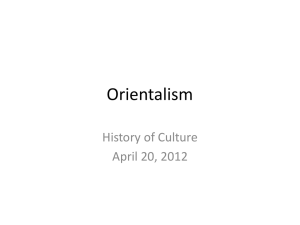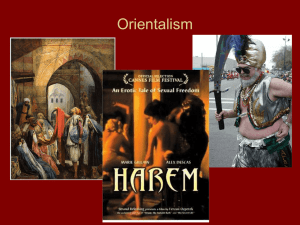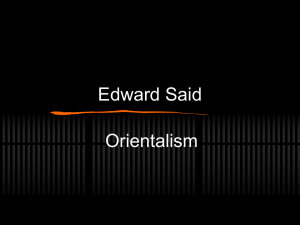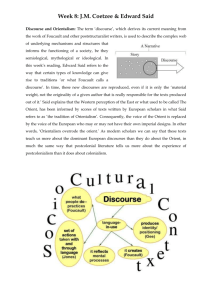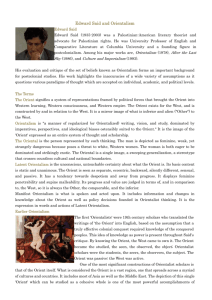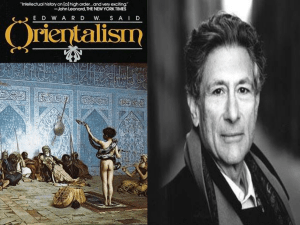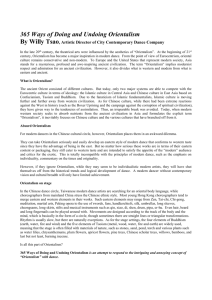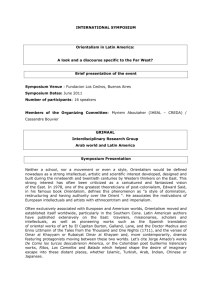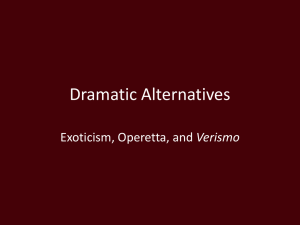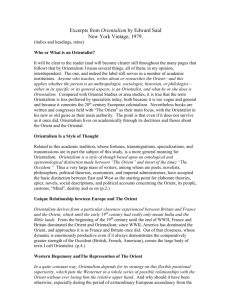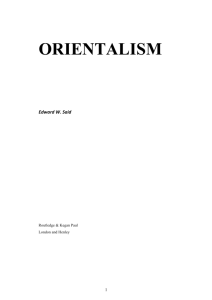Orientalism
advertisement
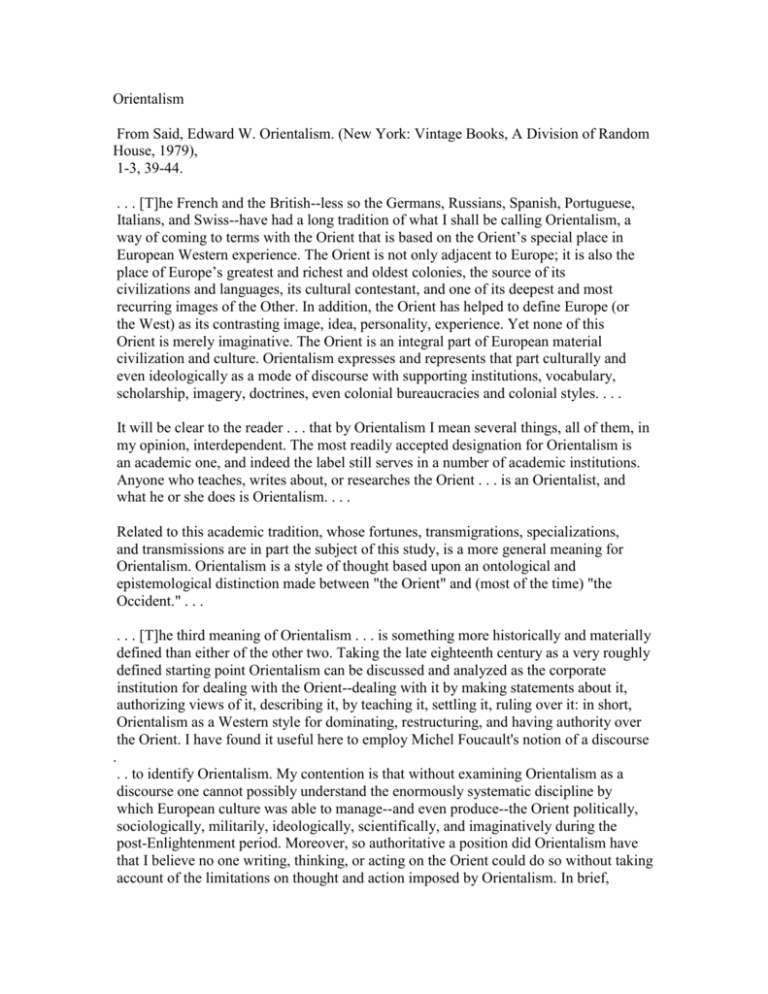
Orientalism From Said, Edward W. Orientalism. (New York: Vintage Books, A Division of Random House, 1979), 1-3, 39-44. . . . [T]he French and the British--less so the Germans, Russians, Spanish, Portuguese, Italians, and Swiss--have had a long tradition of what I shall be calling Orientalism, a way of coming to terms with the Orient that is based on the Orient’s special place in European Western experience. The Orient is not only adjacent to Europe; it is also the place of Europe’s greatest and richest and oldest colonies, the source of its civilizations and languages, its cultural contestant, and one of its deepest and most recurring images of the Other. In addition, the Orient has helped to define Europe (or the West) as its contrasting image, idea, personality, experience. Yet none of this Orient is merely imaginative. The Orient is an integral part of European material civilization and culture. Orientalism expresses and represents that part culturally and even ideologically as a mode of discourse with supporting institutions, vocabulary, scholarship, imagery, doctrines, even colonial bureaucracies and colonial styles. . . . It will be clear to the reader . . . that by Orientalism I mean several things, all of them, in my opinion, interdependent. The most readily accepted designation for Orientalism is an academic one, and indeed the label still serves in a number of academic institutions. Anyone who teaches, writes about, or researches the Orient . . . is an Orientalist, and what he or she does is Orientalism. . . . Related to this academic tradition, whose fortunes, transmigrations, specializations, and transmissions are in part the subject of this study, is a more general meaning for Orientalism. Orientalism is a style of thought based upon an ontological and epistemological distinction made between "the Orient" and (most of the time) "the Occident." . . . . . . [T]he third meaning of Orientalism . . . is something more historically and materially defined than either of the other two. Taking the late eighteenth century as a very roughly defined starting point Orientalism can be discussed and analyzed as the corporate institution for dealing with the Orient--dealing with it by making statements about it, authorizing views of it, describing it, by teaching it, settling it, ruling over it: in short, Orientalism as a Western style for dominating, restructuring, and having authority over the Orient. I have found it useful here to employ Michel Foucault's notion of a discourse . . . to identify Orientalism. My contention is that without examining Orientalism as a discourse one cannot possibly understand the enormously systematic discipline by which European culture was able to manage--and even produce--the Orient politically, sociologically, militarily, ideologically, scientifically, and imaginatively during the post-Enlightenment period. Moreover, so authoritative a position did Orientalism have that I believe no one writing, thinking, or acting on the Orient could do so without taking account of the limitations on thought and action imposed by Orientalism. In brief, because of Orientalism the Orient was not (and is not) a free subject of thought or action. This is not to say that Orientalism unilaterally determines what can be said about the Orient, but that it is the whole network of interests inevitably brought to bear on (and therefore always involved in) any occasion when that peculiar entity "the Orient" is in question. How this happens is what this book tries to demonstrate. It also tries to show that European culture gained in strength and identity by setting itself off against the Orient as a sort of surrogate and even underground self. ... We would be wrong, I think, to underestimate the reservoir of accredited knowledge, the codes of Orientalist orthodoxy, to which Cromer and Balfour refer everywhere in their writing and in their public policy. To say simply that Orientalism was a rationalization of colonial rule is to ignore the extent to which colonial rule was justified in advance by Orientalism, rather than after the fact. Men have always divided the world up into regions having either real or imagined distinction from each other. The absolute demarcation between East and West, which Balfour and Cromer accept with such complacency, had been years, even centuries, in the making. There were of course innumerable voyages of discovery; there were contacts through trade and war. But more than this, since the middle of the eighteenth century there had been two principal elements in the relation between East and West. One was a growing systematic knowledge in Europe about the Orient, knowledge reinforced by the colonial encounter as well as by the widespread interest in the alien and unusual, exploited by the developing sciences of ethnology, comparative anatomy, philology, and history; furthermore, to this systematic knowledge was added a sizable body of literature produced by novelists, poets, translators, and gifted travelers. The other feature of Oriental-European relations was that Europe was always in a position of strength, not to say domination. There is no way of putting this euphemistically. True, the relationship of strong to weak could be disguised or mitigated, as when Balfour acknowledged the "greatness" of Oriental civilizations. But the essential relationship, on political, cultural, and even religious grounds, was seen--in the West, which is what concerns us here--to be one between a strong and a weak partner. Many terms were used to express the relation: Balfour and Cromer, typically, used several. The Oriental is irrational, depraved (fallen), childlike, "different"; thus the European is rational, virtuous, mature, "normal." But the way of enlivening the relationship was everywhere to stress the fact that the Oriental lived in a different but thoroughly organized world of his own, a world with its own national, cultural, and epistemological boundaries and principles of internal coherence. Yet what gave the Oriental's world its intelligibility and identity was not the result of his own efforts but rather the whole complex series of knowledgeable manipulations by which the Orient was identified by the West. Thus the two features of cultural relationship I have been discussing come together. Knowledge of the Orient, because generated out of strength, in a sense creates the Orient, the Oriental, and his world. In Cromer's and Balfour's language the Oriental is depicted as something one judges (as in a court of law), something one studies and depicts (as in a curriculum), something one disciplines (as in a school or prison), something one illustrates (as in a zoological manual). The point is that in each of these cases the Oriental is contained and represented by dominating frameworks. Where do these come from? Cultural strength is not something we can discuss very easily--and one of the purposes of the present work is to illustrate, analyze, and reflect upon Orientalism as an exercise of cultural strength. In other words, it is better not to risk generalizations about so vague and yet so important a notion as cultural strength until a good deal of material has been analyzed first. But at the outset one can say that so far as the West was concerned during the nineteenth and twentieth centuries, an assumption had been made that the Orient and everything in it was, if not patently inferior to, then in need of corrective study by the West. The Orient was viewed as if framed by the classroom, the criminal court, the prison, the illustrated manual. Orientalism, then, is knowledge of the Orient that places things Oriental in class, court, prison, or manual for scrutiny, study, judgment, discipline, or governing. ... . . . What [Orientalists] shared, however, was not only land or profit or rule; it was the kind of intellectual power I have been calling Orientalism. In a sense Orientalism was a library or archive of information commonly and, in some of its aspects, unanimously held. What bound the archive together was a family of ideas and a unifying set of values proven in various ways to be effective. These ideas explained the behavior of Orientals; they supplied Orientals with a mentality, a genealogy, an atmosphere; most important, they allowed Europeans to deal with and even to see Orientals as a phenomenon possessing regular characteristics. But like any set of durable ideas, Orientalist notions influenced the people who were called Orientals as well as those called Occidental, European, or Western; in short, Orientalism is better grasped as a set of constraints upon and limitations of thought than it is simply as a positive doctrine. If the essence of Orientalism is the ineradicable distinction between Western superiority and Oriental inferiority, then we must be prepared to note how in its development and subsequent history Orientalism deepened and even hardened the distinction. When it became common practice during the nineteenth century for Britain to retire its administrators from India and elsewhere once they had reached the age of fifty-five, then a further refinement in Orientalism had been achieved; no Oriental was ever allowed to see a Westerner as he aged and degenerated, just as no Westerner needed ever to see himself, mirrored in the eyes of the subject race, as anything but a vigorous, rational, ever-alert young Raj. ... . . . Orientalism was ultimately a political vision of reality whose structure promoted the difference between the familiar (Europe, the West, "us") and the strange (the Orient, the East, "them"). This vision in a sense created and then served the two worlds thus conceived. Orientals lived in their world, “we” lived in ours. The vision and material reality propped each other up, kept each other going. . . . My argument takes it that the Orientalist reality is both antihuman and persistent. Its scope, as much as its institutions and all-pervasive influence, lasts up to the present.
